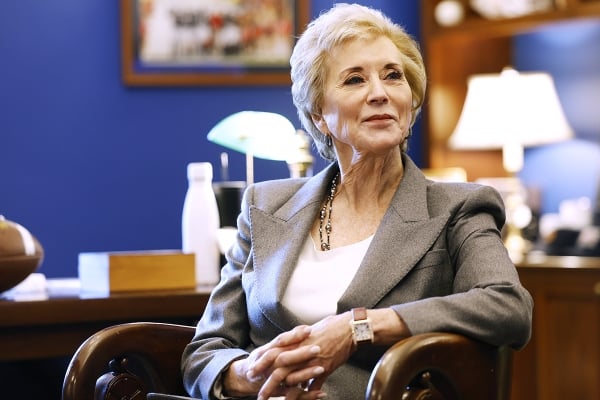Linda McMahon, President Donald Trump’s nominee for education secretary, will appear before the Senate Health, Education, Labor and Pensions Committee next week—a key step in her confirmation process.
And though the former business mogul was originally expected to sail through the confirmation process, she’ll likely have to answer questions at the hearing next Thursday about recent upheavals in the Education Department and the president’s plan to get rid of the agency.
In the last week, news broke that the Trump administration put dozens of department employees on paid leave and is planning an executive order to shut down the department, setting off alarm bells across the higher ed sphere. At the same time, Trump’s attempts to freeze thousands of federal grants and push agency staff toward “deferred resignation” are caught up in court. Education advocacy groups say that halting the grants violates the constitutional principle of separation of powers and that cutting the number of unionized agency staff is not only illegal but also could hinder key operations like the federal student aid program.
But while many of Trump’s executive orders remain in limbo, department appointees who don’t require confirmation are quickly moving behind the scenes to carry out Trump’s education agenda. They’ve opened multiple civil rights investigations into colleges over antisemitism and transgender participation in women’s sports, announced changes to the federal aid application, and removed more than 200 DEI-related webpages from the department’s website.
Trump has yet to announce who will join McMahon and fill other key agency roles, such as under secretary and head of Federal Student Aid, nor has he formally named all the acting officials who will fill those roles in the meantime. The lack of transparency regarding who will lead the department and who is currently serving in temporary roles now has only heightened concerns among higher education officials, policy experts, lobbyists and advocacy groups. The lack of clarity makes it hard to decipher what Trump’s regulatory priorities will be and how colleges, universities, accreditors, students and others should prepare for the next four years. But many are hopeful that McMahon’s hearing will shed some light on the subject.
The secretary-designate, who is best known as the former CEO of World Wrestling Entertainment, has limited experience in education policy aside from serving for one year on the Connecticut State Board of Education and a long-running tenure on the Sacred Heart University Board of Trustees. And to this date, she has made little comment about her views on public education.
She does, however, have some experience working in Washington. McMahon served as director of the Small Business Administration during Trump’s first term. Then, in 2021, as the president reluctantly left office, she helped found the America First Policy Institute, a pro-Trump think tank.
Now, the billionaire is likely to lead the very department Trump has said he wants to see dismantled. The president told White House reporters Tuesday that he told McMahon, “I hope you do a great job and put yourself out of a job.
The Wall Street Journal and The Washington Post reported earlier this week that the new administration is preparing an executive order about the department’s future, though the specifics are still in the works.
Sources told the Journal that the order could “shut down all functions of the agency that aren’t written explicitly into statute or move certain functions to other departments,” but other sources familiar with talks about the order told Inside Higher Ed that the order could direct McMahon, once confirmed, to come up with a plan to break up the department entirely. (The second suggested order, and its resulting plan, would have to include legislative action from Capitol Hill, as the department’s existence is written into law.)
But for now, McMahon is awaiting confirmation and the department still exists. So who’s running the agency and carrying out its statutory duties?
So far, the White House has only formally announced an acting secretary, Denise Carter, who had previously served as acting head of the Federal Student Aid office. A news release from the department several days later listed 10 other appointees, ranging from chief of staff to deputy general counsel. On Thursday, the department shared the names of six more officials, including deputy under secretary and senior adviser of the communications office.
But the department’s announcements about appointees haven’t indicated who is temporarily filing some of the top jobs at the department, such as under secretary. Under federal law, the default acting official is the first assistant to the vacant position or the top deputy for that office, though the president can designate someone else who meets the criteria. Details about who is serving as those acting officials has instead come from other department statements.
For example, James Bergeron—president of the National Council of Higher Education Resources and a Republican former House policy adviser—was named deputy under secretary Thursday. But on Tuesday, the department identified him in a news release as acting under secretary. Before Tuesday’s release, Bergeron had not been listed as an appointee at all. Thursday’s announcement only referred to him as deputy under secretary, not acting.
In another instance, the department named Craig Trainor—who worked under Trump’s attorney general Pam Bondi as an AFPI senior litigation counsel—deputy assistant secretary for policy in the Office for Civil Rights. And then, in later news releases, the agency identified Trainor as the acting assistant secretary for civil rights.
Although the department has yet to announce an acting chief operating officer for FSA, a department official told Inside Higher Ed that Carter is wearing two hats and continuing to lead FSA while serving as acting secretary. Phillip Juengst, a longtime FSA official, they said, is also helping lead the agency.
The Education Department did not respond to Inside Higher Ed’s request for further detail about who is serving in what acting role and why it hasn’t formally been announced. Instead, they pointed reporters back to the news releases mentioned prior.
Most of the appointees so far are unfamiliar faces to D.C. area policy experts and former department staffers.
Bergeron, however, is an exception. He worked at the National Council of Higher Education Resources starting in 2014, advocating for higher education service agencies that work in the student loan space. Some debt-relief groups raised concerns about Bergeron’s appointment. But former department officials described Bergeron as a competent and more reasonable choice than some other Trump appointees. Before serving as president of NCHER, he worked as a staffer on the House Education and the Workforce Committee.
Emmanual Guillory, senior director of government relations at the American Council on Education, said the day after Trump took office that the initial lack of clarity about who was serving in what role didn’t concern him. He didn’t expect Carter or other acting appointees to carry out substantial policy actions before confirmed appointees took control. Guillory said Thursday that his comments haven’t changed, so he remains unconcerned two weeks later.








